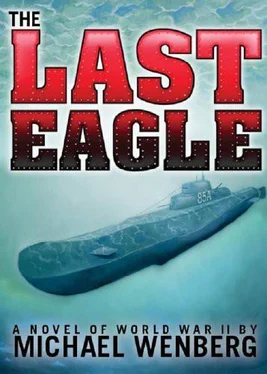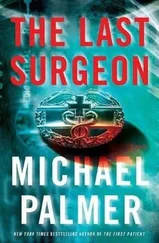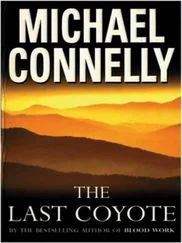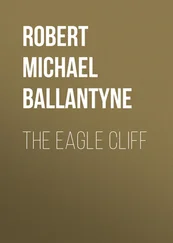Blum calmed himself with three deep breaths and then watched with relief as Tolefson finished his cigarette and flicked the butt into the darkness. At last. Blum watched the tip flare bright red as it arced graceful as a cliff diver toward the ground below.
“Ah, something for you,” Tolefson said, touching his forehead like a forgetful uncle. At first Blum though he was going to offer him a drink from his sliver flask. Instead, he held out a plain, unmarked envelope.
Blum took it with both hands, turned it over, a puzzled look on his face.
Tolefson shrugged. “Perhaps a bonus for taking such good care of me tonight,” he said, not bothering to hide the sarcasm in his voice.
“You think so?” The right amount might help him forgive all the earlier slights and inconveniences.
“Save it for later,” Tolefson ordered before Blum had a chance to tear open the envelope.
Blum felt a flutter of unease. Was he that transparent? “Yes, of course,” he said, clearing his throat. He glanced at his pocket watch. “We really should be going. It would be awkward for me if we are discovered.”
Tolefson didn’t move. “How high are we?” he said, gesturing in the direction of his just departed cigarette.
“Sorry?”
“How high?”
”How should I know,” Blum snapped, finally deciding at that moment that whatever bonus money was in the envelope, it didn’t compensate for this kind of aggravation. He was tired of this man’s games, observations, and silly questions, and so cold his balls ached. “Fifteen meters. Twenty perhaps. Why do you ask?”
Tolefson shrugged. “I can still see the glow from my cigarette below. It doesn’t seem that high.”
Blum gave an exasperated snort and slid forward to look for himself, angry enough to ignore his fear of heights, ready to set him right and then be done with him.
As Blum drew close to the railing, Tolefson pivoted quickly, shoved him forward with his left hand, grabbed him by the back of his trousers with his right, and lifted him into the air.
Blum shrieked as he flipped over the fulcrum of the railing, arms flailing wildly. As he began to fall, he realized with sudden clarity that he had been a greedy fool all along and was now about to die for it.
Tolefson took his time lighting another cigarette. He peered over the edge. Blum was lying chest-down, his right arm bent awkwardly at the elbow. A broken neck had allowed his head to twist around nearly 180 degrees. He gazed up at his killer with the look of a surprised owl, his pale blonde hair glowing faintly in the dark. Tolefson was no longer surprised when he came across a Jew with blonde hair. He finished his cigarette, letting the cold night air and the smoke wash away the distaste of what he had just done.
Someone would notice the body in a few hours. They would find the suicide note inside a plain white envelope in his coat pocket. It would explain everything. Money troubles. Women troubles. A man of weak character. No one had particularly liked Blum anyway. The investigation would take just a day or two, and then it all would be forgotten. No one had seen the pair enter the shipyards together. No one would see Tolefson leave.
Tolefson had nothing against the Jews. And just being a Jew was no reason for Blum to be killed. Greedy, however, that was another matter. And, of course, being greedy was just like a Jew. It was the kind of inane logic that convinced so many that Goebbels, the Nazi propaganda minister, was right after all. He had almost turned down the Gestapo’s orders, despite the risk to his career. He was not afraid of killing in the line of duty, but he was no murderer. He was a soldier. The Gestapo officer must have sensed his conflict. That’s when he had told him about Blum’s contact with the British. “He was already working for us,” he said as if commenting on the indiscretions of a club member. “We just can’t allow that kind of thing.”
“I suppose not,” he said now, his words sounding hollow in the cold night air. He lingered for another moment longer, staring hard at the Polish submarine visible under distant lights, strangely reluctant to leave.
Earlier, he had walked the Eagle’s decks with Blum trailing behind like a lost dog, inspecting every pipe, locker and fitting. He was surprised by how familiar and comfortable it all seemed.
Of course, the Eagle was nothing like the submarines he had served on in World War I, or even the more updated version he had captained before assuming his current post. She was faster and more lethal than any submarine in the world. There was something right about this ship. He had sensed it as soon as he stepped onto her deck. That’s when he began to envy the man who would soon be her captain. Lucky Polish bastard.
What was it Blum had said? “A shame,” no, “a bloody shame.” Those had been his words.
The fool was right about one thing. It was a shame. When war began, she would be an early target. If the Luftwaffe didn’t sink her, the Kriegsmarine would hunt her down and blow her out of the water. A vessel as fine as the Eagle deserved better, but her fate was all but sealed. Tolefson flicked his cigarette into the night, glanced one last time at the Eagle and smiled at a sudden thought.
Or was it?
Karl Dönitz, chief of the German Navy’s U-boat operations— U-Bootwaffe —stared out the window of his top-floor office, across the broad boulevard choked with traffic, to the park beyond. In recent years, it had bustled with constant activity. Old men playing chess, young lovers strolling along the sidewalks and paths, children kicking soccer balls, playing hide and seek, or running for the sheer joy of it beneath the hawk-eyed gazes of their keepers. And for the hungry, there was the ever-present bratwurst cart, gleaming red in the sunshine like a circus wagon.
Dönitz smiled to himself at the thought of the cart’s crafty, one-armed owner. Did anyone else ever notice? He was always stationed upwind, making sure the tantalizing perfume of his sizzling brats didn’t miss a nose, working on the subconscious of the unwitting like a gastronomical Pied Piper.
His name was Friedrich Pfundt. He’d introduced himself without apology months earlier, when Dönitz’s rumbling stomach had led him across the street and the admiral decided to stretch his legs and go himself instead of sending one of his aides on the errand for him.
“Will there be war, Admiral, sir?” he had asked, recognizing Dönitz’s face from his frequent photograph in the newspaper. He deftly slapped chunks of sausage on a paper plate, adding dabs of hot mustard and horseradish, and then holding it out for him to take.
Dönitz picked up a piece of bratwurst with his fingers, eyeing the man as he considered his response. One-armed vet, not even bothering to pin up the sleeve of his yellowed shirt, letting it flap at his side like an appendage with a mind of its own. Black, shapeless pants and sturdy work boots finished a costume that was topped off by a sunburned face that looked as if it had once been crumpled in anger like a sheet of paper.
More than likely he was just a sausage vendor. But he had been fooled before. Nowadays, anyone could be Gestapo.
“Goddamn right there’ll be war,” Pfundt answered for him, following his words up with a cackle of glee. “About goddamn time, too. I’d go again if they’d take me—”
“You have already given more than enough to the Fatherland.” The admiral wiped mustard from his lips, slipped another hunk of sausage into his mouth and began to chew.
Pfundt shrugged as if it was nothing. “I left my goddamn arm hanging from a smoking snag in the Ardennes. But at least it wasn’t something more important, if you know what I mean.” He wagged an uncooked brat near his crotch for emphasis, and then cackled again, startling crows in a nearby oak. “I can still fight. Best damn one-armed shot in all of Germany. If you ask me, we should sit tight, act nicely nice, take care of what we’ve got, maybe get the Yanks and the Brits on our side, and then we strike when they least expect it.”
Читать дальше












